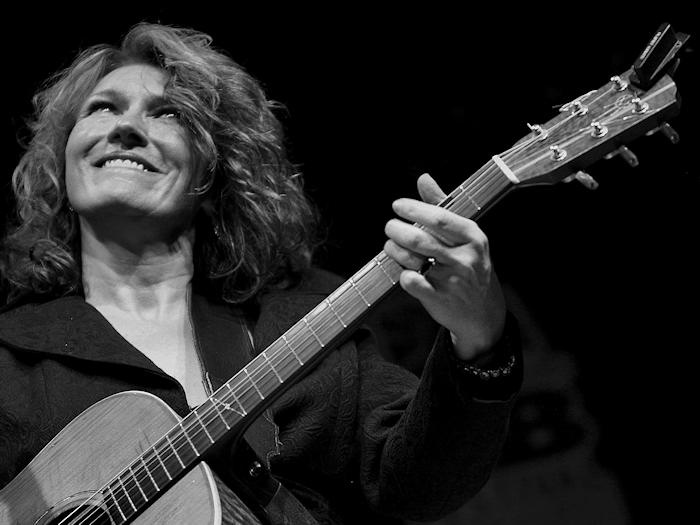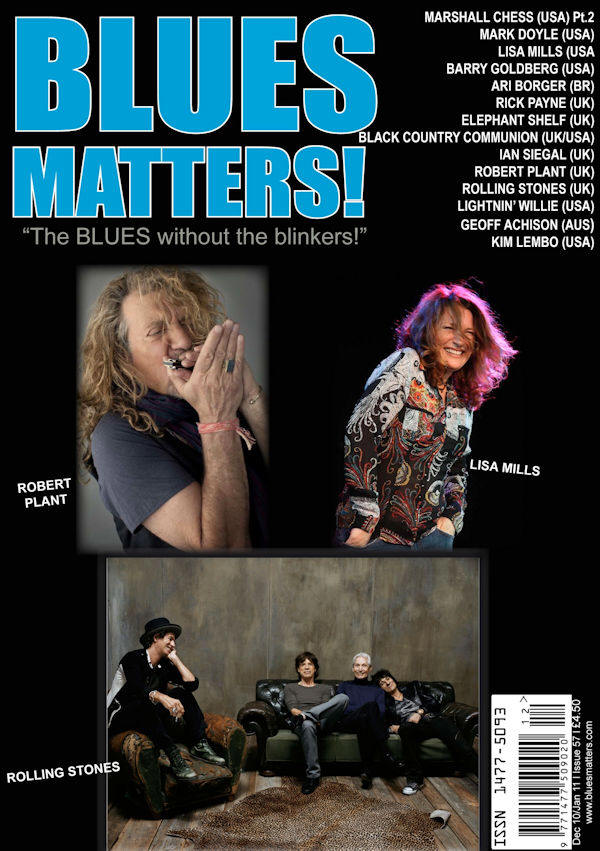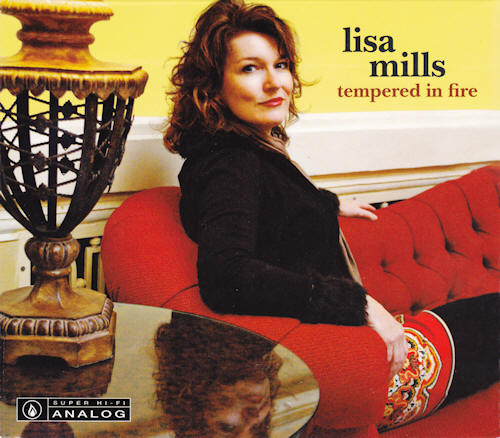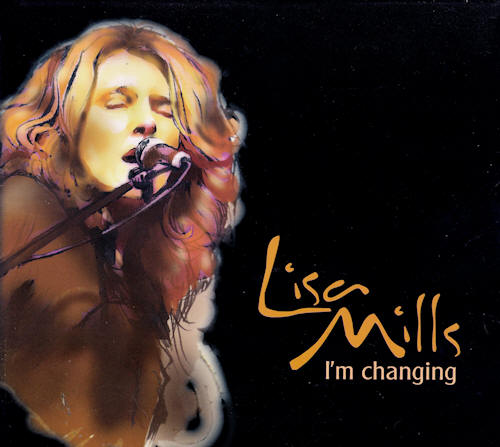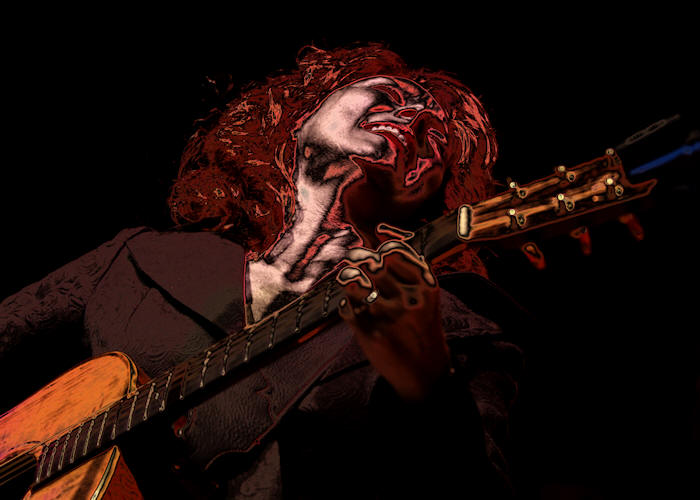
Painting © 2004 Loz
Arkle
Website
© Copyright 2000-2011 Alan White - All
Rights Reserved
Site optimised for Microsoft Internet Explorer
Early Blues Interview
|
|
Lisa grew up in and around Hattiesburg Mississippi, beginning her singing career in the church that her grandparents actually built. Gospel was her first musical love, and still is deeply embedded in her artistic foundation. Her mother loved Elvis, and her father loved Hank Williams Sr. Mix that in with a few Brenda Lee records, Lisa had quite a diverse background to develop her early musical education. Lisa grew up on gospel and soul and began composing songs before she was old enough to start school. Destined to perform, Lisa poured her heart into writing, singing and playing guitar, gathering strength like the hurricanes that brew in the Gulf of Mexico. Her vocal influences ranged from Etta James to Brenda Lee. A friend who recognized Lisaís potential sent Sam Andrew of Big Brother and the Holding Company a copy of Blues and Ballads, her first CD, recorded live in Pascagoula, Mississippi. It was the connection that landed Lisa her first international gig, in Germany, and a three-year tour as BBHCís lead singer. It was the European connection that led her to meet Ian Jennings and then Robert Plantís sound engineer Roy Williams, who encouraged her to take her rightful place as a solo artist.
Lisa has been performing
summer tours in the U.K., and Europe, since 2001. While primarily
performing her own solo tour, where she played such venues as The
Glastonbury Festival, U.K., where she received a standing ovation from a
crowd of over ten thousand people, the Gloucester Blues Festival, U.K.,
with Mike Sanchez and his Rhythm Review, along with Andy Fairweather
Low, and The Ole Blues Festival, in Bergen Norway. She has also opened
for, Dr. John, Delbert McClinton, and Tony Joe White".
ďLisaís guitar playing is reassuringly functional, sometimes,
surprisingly lyrical, always true to its roots in Southern Soul, blues
and gospel. Itís the voice you come to hear, though - moving from a
whisper of vulnerability to a harshly defiant rasp, coupled to masterful
on-off-mike technique, and with a scary rangeÖ add to that real writing
skills, and Lisaís a force to be reckoned with.Ē
_________________________________________________________________________ I first saw Lisa Mills open the Saturday afternoon session at the 2008 Maryport Blues Festival and was knocked out by her stunning performance. Since then I've been a fan, seeing her several times on UK tours. I met up with Lisa again at the 2011 Great British R&B Festival in Colne, Lancashire. Alan: What were your first musical memories growing up in Mississippi? Lisa: Church, and Elvis. Pretty good stuff huh! Oh, and my Dad of course. He played a bit of guitar and he sounds like the real honky tonk deal when he sings Hank Williams and Johnny Cash and the old standards like Fraulein, Fraulein. Alan: Did you always want to become a musician or singer? Lisa: I donít know if itís what I wanted, but itís what Iíve always done. I donít think I ever chose it, it just sort of happened. I was singing in church and theyíd bring me out when family members were coming over to visit, after church weíd go to my Uncle Shelbyís house and weíd sit around the piano and sing and Iíd sing for the other kids in the playground. It was just always something I did, just happened. Alan: So how did you get started as a musician; how old were you? Lisa: My first paid gig was when I was in high school. I got a gig at a local Italian restaurant playing guitar and singing and during that time I was doing a lot of folk tunes, like Anne Murray, One Tin Soldier. I must have been around 17, right there in Hardy Street, Hattiesburg, Mississippi.
Lisa: A couple of things really: in college there was a band that I met and they were heavily influenced by the Blues Brothers and they introduced me to the movie. Growing up I heard plenty of country music because of my mum and my dad and of course gospel but I didnít have a clue about blues music. I grew up in south Mississippi and never even heard it. The only think I knew is that we used to take the bus route past an intersection with a juke joint there and it was painted pink with Christmas lights on it and I knew was that it was a bad place, but thatís all I knew about blues music till I saw the Blues Brothers movie and this band that I met in college covered a lot of that kind of music. Because of the movie I bought, strangely enough, a Chaka Khan record, but it wasnít until my late 20s that I heard Etta James for the first time. I was driving down the main road in Mobile and there was a local radio station that played this song that, at the time I thought was Damn Your Hide. But you know what, even though I say I wasnít exposed to blues music till then, I do remember the only time that I really related to songs on popular radio were songs like Misty Blue. That is actually a Mississippi singer, Dorothy Moore. Misty Blue and songs like Kiss and Say Goodbye, and Midnight Train to Georgia were the songs that I related to even as a young person without realising what kind of music it was. Itís that soul, gospel thing that Iíve always loved without knowing what it was. Alan: For three years you were lead singer with Big Brother and the Holding Company and, to quote, ďmaking those blues classics made famous by Janis Joplin her ownĒ. How did that come about?
Alan: How did you first meet up with your long-term performing partner Ian Jennings? Lisa: I met Ian for the first time in London at Sweet Georgia Brownís studios when our mutual friend arranged for me to come over and record on his album. Before I got here I hadnít even heard two of the songs that he had me sing and they were in somebodyís elseís key but thatís where I first met Ian. Then I came back to London several months later to record a demo we met up again and started doing gigs together and became friends.
Alan: Iíve got another quote here, ďMills and Jennings, a musical force to be reckoned withĒ. How would you describe the musical chemistry youíve got, as you play so well together? Lisa: As far as personalities go, itís a case of opposites attract. Heís very steady and even tempered and always there with his feet on the ground. Thatís a really good quality for a bass player to have. On the other hand, Iím all up in the air in every way possible, not just musically but personally. I feel like he grounds me and makes me feel safe so I can fly about and do my thing. And for him, itís fun for him to help me to fly around so we work together that way. Heís taught me to be a bit more disciplined in some respects and Iíve helped him be a bit more spontaneous and adventurous. As a bass player in normal situations heíd just play these parts but with us thereís a whole lot of room and heís learned how to use his bass in a more melodic way. When you play solo or duo you take on many roles so itís very rich what happens for the both of us.
Lisa: On a conscious level the person that most influenced me that I deliberately listened to and still admire and respect is Etta James, coming from that black gospel background in the blues and the song. Deeper than that is the early records of Elvis Presley and Brenda Lee that my Mom had. In between there somebody gave me my first Bonnie Raitt album and sheís a role model for me because she spanned all these different kinds of music, blues, pop, rock and she was a red headed white girl who could sing the blues, with freckles! Alan: Did you ever meet Dick Waterman [Bonnie Raitt's long time friend and promoter]?
Alan: Looking back at your career so far, what are your fondest memories? Lisa: Thatís like asking which of my kids is the favourite Ė that is so hard and there are so many of them. Perhaps the time I met Ian, that was a special moment, but there are so many of them. Alan: What about particular songs, are there any that have special meaning to you? Lisa: Yes, always, and there are many of them. But I thought you were going to ask which of my special songs do I never ever get tired of singing so Iíll give you my honest first thoughts and the first one is Warm and Tender Love by Percy Sledge. Itís such an intimate expression of love and feeling and it is the kind of melody and song that gives a singer a lot of room to express themselves. Alan: Between songs you tell tales of southern life and, to quote, 'pistol-packin' grannies, trailers and all', a born entertainer'. Do you think artists generally need to be more communicative with their audience?
Alan: I read in a review that one of your songs was written in Kidderminster with Ian, close to the residence of a Mr Robert Plant. Are we likely to see a collaboration in the Krauss/Plant vein? Lisa: I think youíd better ask him that. Iím not cheeky enough to ask him but if he ever asked me then yes, Iíd do it. I have a lot of respect for him. An amazing artist.
Alan: How healthy do you think the music scene is in the UK and Europe compared to the US? Lisa: I wouldnít dream of presuming to be able to say! But I have noticed in the last year or so that I have seen a lot of festivals close down, music stores closing and it seems to be a little tougher for musicians to get gigs and for audience members to be able to play to go to the gigs. Based on those anecdotal evidences it looks like thereís something going on here in relation to the economy as a whole. For me personally, playing local gigs in my area Iím doing really well and Iím staying really busy. So, back home Iím doing good but over here my friends are telling me that things are kind of tough. Alan: Tell me about the making of your latest album, Tempered in Fire co-produced with Ian Jennings.
Alan: How do you see the future of blues music? Lisa: Oh God Ė you know Iím not qualified to answer that question! I think I did an interview with the Telegraph and they asked a similar question so Iíve had time to think about it. The way I see it, if you look at architecture and art and music as the things that last and people still treasure and will continue to treasure for ever, blues is one of those forms of music that I think people will always treasure and admire. It seems to me it goes in cycles and then it gets rediscovered. Itís in an endless cycle of rediscovery and thereís always going to be a segment of society that holds true to it and nourishes it and itíll upswing again. When itís good, itís good. I donít think itís ever gone anywhere and I don't think its ever going away and itís just a wave of love and appreciation. Itís timeless, it's about human emotion, itís the good stuff man, the good stuff! Alan: Thank you very much Lisa, I really appreciate your time. Lisa: Thank you, Alan
_________________________________________________________________________
Europe Management: Phil Beaumont Check out Lisa Mills at the Great British R&B Festival, Colne 2011 Check out Lisa Mills at the Maryport Blues Festival 2008 Check out the Interview with Ian Jennings
_________________________________________________________________________
Return to
Blues Interviews List |








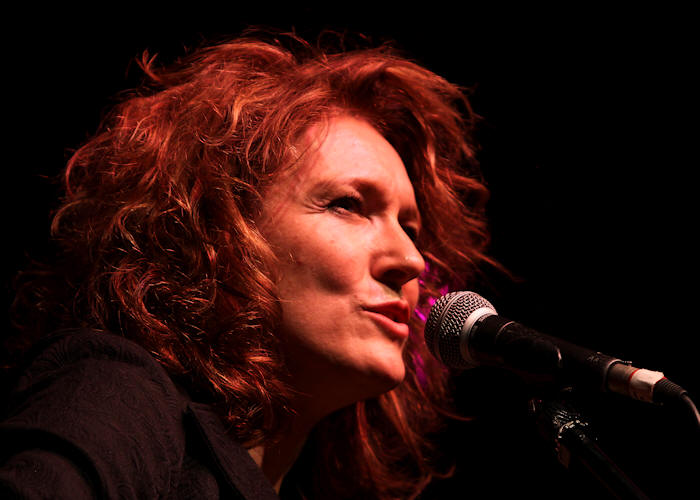
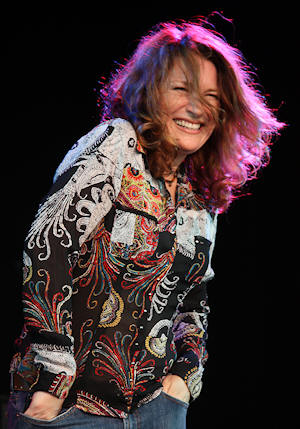 "Lisa
Mills is an incredibly gifted singer, guitarist, and songwriter. Born
and raised in Mississippi, she is well grounded in her blues based,
soulfully delivered original music.
"Lisa
Mills is an incredibly gifted singer, guitarist, and songwriter. Born
and raised in Mississippi, she is well grounded in her blues based,
soulfully delivered original music. 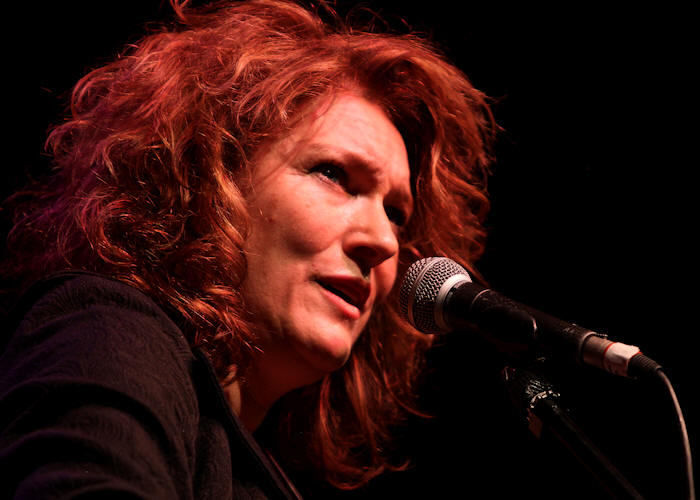
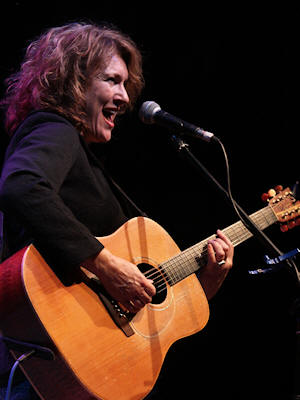 Alan: What first
attracted you to blues music?
Alan: What first
attracted you to blues music?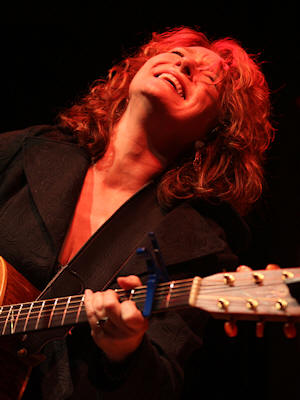 Lisa: Well, I wouldnít
say that! But for several years I was playing in a duo out of that
Mobile area and we split up personally and professionally and all of a
sudden I had to play solo. I was scared to death and people were always
asking me, ďWhere is he, where is heĒ and I was having to say, ďItís
just meĒ. So one of the very first gigs I had as a solo artist where I
started feeling accepted and appreciated on my own was this little blues
club in Pascagoula, Mississippi called Spices. The first time I booked
there I walked in the door and everybodyís applauding. It was a real
magical place. The owner of that club was a huge fan of mine and it was
his idea to record me live there and to manufacture the CD called Blues
& Ballads. That CD got in the hands of this girl in the local area who
is best friends with Sam Andrewís wife. So that girl got the CD to Sam
Andrew and he started emailing me and getting in touch. At the time I
was divorced, two kids and getting my Bachelor of Fine Arts Sculpture
degree. I was hesitant for those reasons and I didnít see myself as a
Janis Joplin but he kept saying, ďYouíll sing a lot of your own stuff,
weíll do the bluesĒ so eventually I said, okay, okay. That's how I ended
up playing with Big Brother and the Holding Company.
Lisa: Well, I wouldnít
say that! But for several years I was playing in a duo out of that
Mobile area and we split up personally and professionally and all of a
sudden I had to play solo. I was scared to death and people were always
asking me, ďWhere is he, where is heĒ and I was having to say, ďItís
just meĒ. So one of the very first gigs I had as a solo artist where I
started feeling accepted and appreciated on my own was this little blues
club in Pascagoula, Mississippi called Spices. The first time I booked
there I walked in the door and everybodyís applauding. It was a real
magical place. The owner of that club was a huge fan of mine and it was
his idea to record me live there and to manufacture the CD called Blues
& Ballads. That CD got in the hands of this girl in the local area who
is best friends with Sam Andrewís wife. So that girl got the CD to Sam
Andrew and he started emailing me and getting in touch. At the time I
was divorced, two kids and getting my Bachelor of Fine Arts Sculpture
degree. I was hesitant for those reasons and I didnít see myself as a
Janis Joplin but he kept saying, ďYouíll sing a lot of your own stuff,
weíll do the bluesĒ so eventually I said, okay, okay. That's how I ended
up playing with Big Brother and the Holding Company.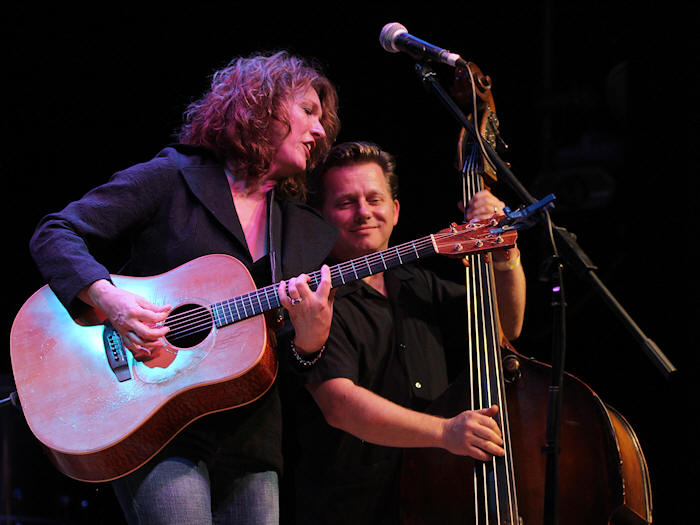
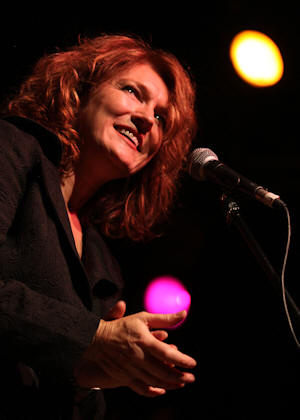 Alan: Whoís
influenced you the most in your music writing, playing and singing?
Alan: Whoís
influenced you the most in your music writing, playing and singing?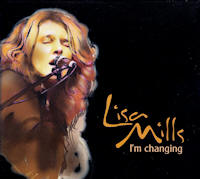 Lisa: Oh yes, speaking
of Bonnie Raitt and the connections, boy, is he a legend! I saw him
recently in Portland at the Waterfront Blues Festival. When I was
preparing to master my first studio album 'I'm Changing' Dick and
I were in contact via email and I asked him for suggestions about
mastering and he recommended a place in Oxford, Mississippi, so I ended
up staying up there with him to get that done. It was a real honour
and, boy, heís a walking encyclopaedia.
Lisa: Oh yes, speaking
of Bonnie Raitt and the connections, boy, is he a legend! I saw him
recently in Portland at the Waterfront Blues Festival. When I was
preparing to master my first studio album 'I'm Changing' Dick and
I were in contact via email and I asked him for suggestions about
mastering and he recommended a place in Oxford, Mississippi, so I ended
up staying up there with him to get that done. It was a real honour
and, boy, heís a walking encyclopaedia.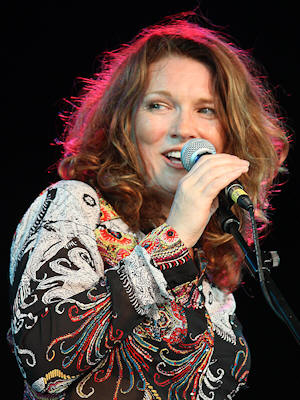 Lisa: Okay, I think
there are two ways to look at this, and I'll give you an example.
Thereís a venue in Mobile that Iíve played before and the owner of the
venue was dating one of my good friends. From his perspective he
doesnít like to hear a lot of talking in between the songs. From her
perspective, thatís the best part of the show. So I guess it depends on
the audience member if they like that or appreciate it. For me, itís
another way of connecting with the audience and sharing something of
yourself. I personally think it's important. I like to be elegant but
I could never be glamorous and I could never be that slick musically
where itís all, bam, bam, you know one song after another; I like the
organic quality. For me, live performance is about being in that
moment, with those people with that energy in that time and space where
you are. The most beautiful thing that can ever happen is when they all
come together and it works. Then itís magic, just magic but you canít
force it on the moment you have to accept it and go with it. Sometimes
when you are with an audience thatís not giving you a lot back, you just
got to go with it. I always tell people, ďIf you werenít here I could
just stay home and sing in the shower and thatís not very much funĒ.
Itís like life, itís different every time even though itís the same and
thatís the beauty and magic of being fully alive.
Lisa: Okay, I think
there are two ways to look at this, and I'll give you an example.
Thereís a venue in Mobile that Iíve played before and the owner of the
venue was dating one of my good friends. From his perspective he
doesnít like to hear a lot of talking in between the songs. From her
perspective, thatís the best part of the show. So I guess it depends on
the audience member if they like that or appreciate it. For me, itís
another way of connecting with the audience and sharing something of
yourself. I personally think it's important. I like to be elegant but
I could never be glamorous and I could never be that slick musically
where itís all, bam, bam, you know one song after another; I like the
organic quality. For me, live performance is about being in that
moment, with those people with that energy in that time and space where
you are. The most beautiful thing that can ever happen is when they all
come together and it works. Then itís magic, just magic but you canít
force it on the moment you have to accept it and go with it. Sometimes
when you are with an audience thatís not giving you a lot back, you just
got to go with it. I always tell people, ďIf you werenít here I could
just stay home and sing in the shower and thatís not very much funĒ.
Itís like life, itís different every time even though itís the same and
thatís the beauty and magic of being fully alive.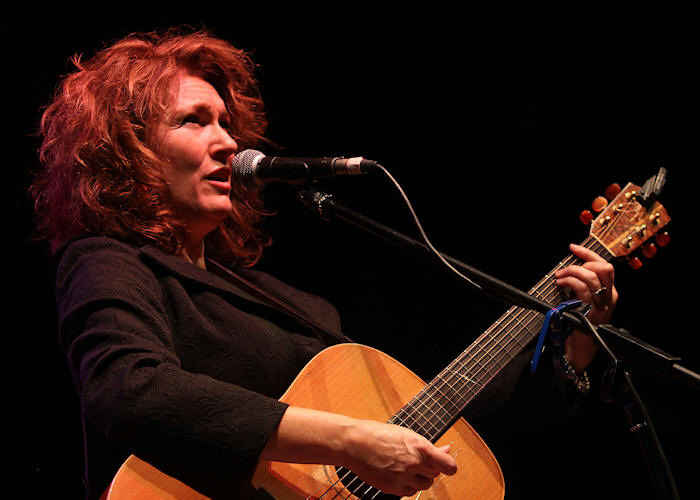
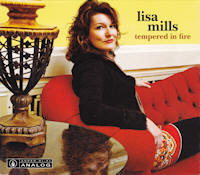 Lisa: It was a good
thing the title was Tempered in Fire because we were covered in snow
from the moment we arrived in Kent. In fact Andy Fairweather Low had to
drive up from Cardiff and he barely made it. We rented an oast house
close to the studio and the engineer had to meet us in a four wheel
drive to get us there. Earlier you asked me about memories and I have
to tell you that being with those guys and making that album was one
real big happy memory. We were all eating and living together for 10
days and I was doing home-cooked meals every day. Everybody was together
like ďthe bandĒ. Andy Fairweather Low is one of very favourite guitar
players, ever, and it was a dream come true to have him play on the
album. He is just as much a gentleman as he is a fantastic player. It
was a great experience.
Lisa: It was a good
thing the title was Tempered in Fire because we were covered in snow
from the moment we arrived in Kent. In fact Andy Fairweather Low had to
drive up from Cardiff and he barely made it. We rented an oast house
close to the studio and the engineer had to meet us in a four wheel
drive to get us there. Earlier you asked me about memories and I have
to tell you that being with those guys and making that album was one
real big happy memory. We were all eating and living together for 10
days and I was doing home-cooked meals every day. Everybody was together
like ďthe bandĒ. Andy Fairweather Low is one of very favourite guitar
players, ever, and it was a dream come true to have him play on the
album. He is just as much a gentleman as he is a fantastic player. It
was a great experience.